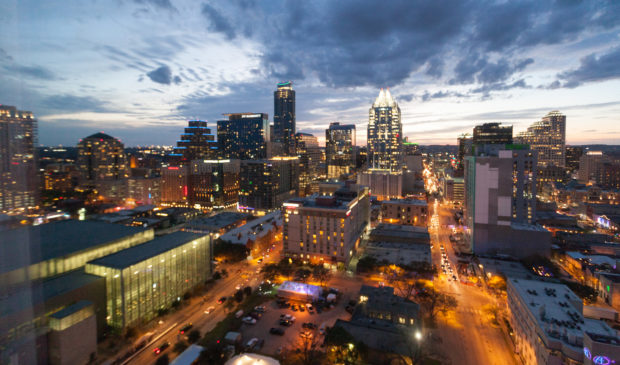Austin’s hotels resting well without Uber and Lyft
Tuesday, July 19, 2016 by
Caleb Pritchard More than two months after Uber and Lyft shut down operations in Austin, one sector whose customers relied heavily on the companies has collectively shrugged and embraced the proliferation of new and existing alternatives.
At a convention-style meet-and-greet at the Hyatt Regency hotel on Monday, representatives of those alternatives – including several of the upstart ride-hailing companies looking to capture Uber and Lyft’s rides-on-demand magic – showed off their services to members of the local hotel industry. The event was sponsored by the Austin Hotel and Lodging Association and the Austin Concierge and Guest Services Association.
Despite a rough start in the first few weeks, the hoteliers told the Austin Monitor, guests and staff are getting along fine without the two San Francisco-based corporate giants.
“It was difficult in the beginning to find any sort of transportation for our guests,” said Nick Houston of the Radisson in downtown Austin. “But in the months since Prop 1 failed, we’ve started using the companies that are here today. And a lot of the companies that were already here have stepped up their game and added more drivers and vehicles, so we’ve been able to start using them as well.”
“For me, what changed the most was that we had to retrain ourselves to provide assistance to the guests,” explained the W.’s Leo Rossini. “Because Uber has become a part of the way people in the U.S. live. When you go to a new city, you have the Uber app and you open it and you don’t have to ask for help from anybody.”
Uber and Lyft left Austin in May after voters overwhelmingly rejected a referendum that would have rewritten city regulations to the two companies’ tastes.
Rossini said that his hotel has trained its staff to proactively seek out guests who might be rattled by the absence of familiar ride-hailing options.
Since Uber and Lyft left, a legion of new startups moved in and applied for permits to operate in the city. At least four of those companies were at Monday’s event. Representatives from Wingz, Ride Austin, Fare and Arcade City set up booths alongside limousine services, Yellow Cab, pedicab companies and SuperShuttle.
Ivan Benavides of Ride Austin, a nonprofit operation, told the Monitor that his company is mulling the use of promotion codes to incentivize hotel and bar employees to encourage guests to use the app.
Will Binford of the InterContinental Stephen F. Austin hotel explained that staff members are encouraged to use their own discretion in recommending transportation options to guests.
“It’s much like making a dining recommendation for a guest who comes to you and says, ‘I want a hamburger,’” Binford said. “Your recommendation is going to be different from mine, which is going to be different from someone else’s. So that’s where the training aspect has had to kick in so that we can ask open-ended questions to better understand what kind of ride experience they’re looking for.”
Added Houston, “We’re kind of learning by trial and error. If the guest comes back and says, ‘This was an absolutely horrible experience, how dare you recommend it?’ even though I may have had a great experience with that company, we can no longer really recommend it through the hotel.”
Rossini said that the most notable impact of the departure of Uber and Lyft is in the receipts at hotel bars. He said the drop in business at the W.’s Living Room has been “drastic,” though he was unable to cite specific numbers. Both Houston and Binford confirmed that revenues at their bars were also down, even though their hotel business has remained steady.
Aside from out-of-town guests, Uber and Lyft’s departure has had another noticeable impact on the hotel industry. Rossini said that he has been forced to reschedule employees who depended on the services to get to work.
“Some people I can no longer schedule on certain times on weekends because of the bus situation,” Rossini explained.
Sheena Gendron of the JW Marriott agreed and elaborated. “Capital Metro didn’t bother putting on any extra buses (after Uber and Lyft left),” she said. “So when our workers had to go to work on Sunday morning at 6:30, they couldn’t rely on Uber to get them there anymore, and they couldn’t rely on a bus, either.”
Gendron said that half of her staff are international interns who live on East Riverside Drive.
While the four hoteliers agreed that Austin’s ride-hailing scene has not devolved into an anarchic mess that some had feared, they agreed that the new status quo is not ideal.
“In my opinion, in a city like Austin that is growing as fast as we’re growing, the transportation system is a shame,” said Rossini. “It’s a shame.”
Photo by Ed Schipul made available through a Creative Commons license. A complete list of Austin Monitor donors can be found here.
You're a community leader
And we’re honored you look to us for serious, in-depth news. You know a strong community needs local and dedicated watchdog reporting. We’re here for you and that won’t change. Now will you take the powerful next step and support our nonprofit news organization?









